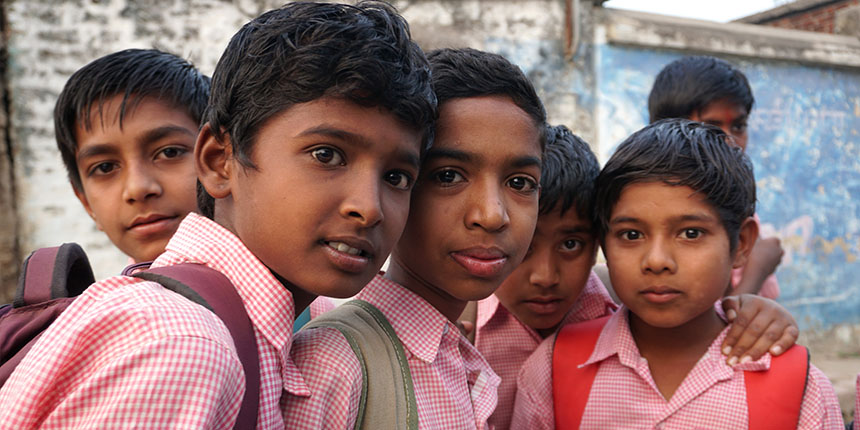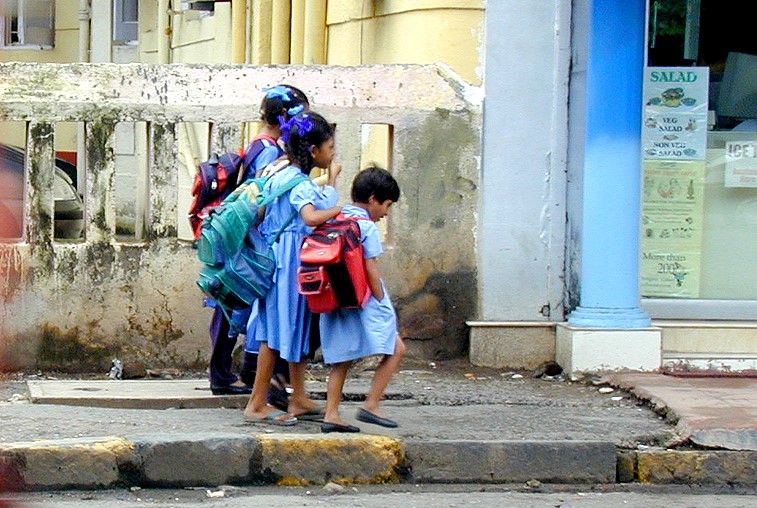Failing children: Many states will make primary schoolers repeat classes
Atul Krishna | November 16, 2019 | 02:41 PM IST | 8 mins read

NEW DELHI : On March 1, 2019, an amendment to India’s most important law on school education, The Right of Child to Free and Compulsory Education Act, 2009, was notified. The amendment permits states to do two things: hold examinations in Classes 5 and 8 and make children who fail these exams repeat those classes.
This overturned the “no-detention policy”– a crucial provision of the Right to Education (RTE) Act that, in 2010, had imposed a country-wide ban on the practice of making elementary school children who fail exams repeat classes. The decision came after years of deliberations pitting the state governments, many of which wanted the policy scrapped, against academics and activists who believe grade repetition will only encourage the most disadvantaged students to drop out.
Now, it is up to the states to decide whether to detain and several have decided to do so. Gujarat, Odisha, Madhya Pradesh, Jharkhand, Karnataka have all decided to detain students. In addition to detaining children, most of these are also likely to hold public examinations, akin to board exams, in Classes 5 and 8.
Some states, including Delhi, are yet to finalise their policies. The Capital’s Aam Aadmi Party government had vehemently opposed the no-detention policy but is apparently in no hurry to implement the amendment. Kerala, which according to the Centre’s think-tank, NITI Aayog, runs the best performing school system in the country, has chosen not to detain.
‘Regular examination’
“The state has a policy of 100% enrolment and 100% retention,” said A Shahjahan, secretary, Kerala General Education Department. “We have decided not to have a public exam for Class 5 and 8 and are continuing the same policy of no detention.”
Few have followed this path as most state governments had been clamouring for an amendment. At a 2015 meeting of the Central Advisory Board of Education (CABE), 23 out of the 28 states had supported the scrapping of the NDP. State representatives argued that the policy leaves students unprepared to face public examinations leading to an increased failure rate in the Class 10 board examinations and also causes an overall decrease in learning. Without the threat of failure hanging over their heads, children do not study, it was argued.
Now, several states are opting to hold public exams, conducted by agencies outside the school, in Classes 5 and 8. The Right to Education Act prohibits board exams at the elementary stage and that provision, Section 30 of the Act, still stands. However, the amendment has diluted the central policy. First drafted in 2017, it provides for a “regular examination in the fifth class and in the eighth class at the end of every academic year” but does not clarify the nature of the exam.
Consequently, many states are opting to hold high-stakes public exams for Classes 5 or 8 or both.
Karnataka, which was in favour of ‘no detention’ in 2015, has now waded into controversy with its decision to introduce public examinations for Class 7. According to media reports, the state has also decided to detain students at the end of Class 7 for which there is no provision even in the amended law.
The Karnataka State Commission for the Protection of Child Rights (KSCPCR) has demanded an explanation for this decision. “The Karnataka government’s decision goes against the spirit of RTE. It is a violation of section 16 of RTE read with section 3 of the rationale given by MHRD, where education is a fundamental right and the completion of elementary education is a necessity,” said Dr. Niranjanaradhya V. P, Fellow and Programme Head at the Centre for Child and the Law, National Law School of India University, Bengaluru. The state officials could not be contacted for clarification.
Odisha, too, is planning to conduct public examinations. “The government is yet to decide on how these examinations will take place but it will probably be conducted by the respective district educational departments,” said Odisha’s special secretary of School and Mass Education, Biswanath Pradhan. The final decision on who will conduct the exams will be taken in the beginning of November, he added.
On the violation of the RTE’s ban on board exams, another Odisha official, requesting anonymity, said: “Some contradictions do exist in the RTE Act. It is up to the state governments to interpret and implement it.”
Meanwhile, the Tamil Nadu government, after months of see-sawing, issued an order saying, “The Directorate of Elementary School Education has sought permission to conduct public exams for Classes 5 and 8” and that “for the next three years no student will be detained based on their result in these exams”. The state education minister K.A. Sengottaiyan later clarified to the media that although exams will be conducted, the results won’t be published for the first three years after implementation. This essentially means that the detention policy will only be effective from the academic year 2022-23.
Jharkhand will conduct examinations for Classes 5 and 8 and has decided to detain only students of Class 8, said A.P Singh, Principal Secretary, Department of School Education and Literacy Development. “The examinations for the academic year 2019-20 will be conducted by the State Council for Educational Research and Training (SCERT) Jharkhand,” he said. The SCERT advises states on curriculum and textbook design.
News reports suggest that both Gujarat and Madhya Pradesh have decided to introduce public exams for Classes 5 and 8 and will choose to detain students in both classes. The state officials could not be contacted for further clarification. Gujarat Education Minister Bhupendrasinh Chudasama announced during the budget session and later repeated the same to the media that if a student of standard 5 or 8 fails in that exam and the re-test, which will be held within two months, that student will have to repeat the course. Ahmedabad-based education activist, Mujahid Nafees, said activists on the ground had opposed the decision. “The government is using this policy to instil fear in students,” he said. “No detention policy is not just about passing or failing but about removing the students’ fear of learning.”
 Photo Credit -Wikimedia Commons
Photo Credit -Wikimedia Commons
Pending decisions
Some states are yet to decide on the matter. Most notable among them is Delhi whose deputy chief minister, Manish Sisodia, was one of the most vocal critics of the “no-detention policy”. The state still seems to be dragging its feet over the decision. An official from Delhi’s Education Department said that no further action has been taken since a committee set up to frame the state’s policy submitted its recommendations in early March. The majority members of the committee had recommended school-based exams and detention in both classes.
Uttar Pradesh’s Sarvendra Vikram Singh, director of the State Council of Educational Research and Training, said that the state is “still going through deliberations and is yet to take a decision on this matter”.
‘Deflecting blame’
Activists fear that the amendment will cause a large number of the poorest and most marginalised children, who need the most attention to drop out of the school system. “If children are not able to perform to the expected levels after studying a whole year due to the lack of quality teaching and infrastructure and other systemic issues, then how are they expected to do so after an additional two months in the same system?” asks Ambarish Rai who is the national convenor of RTE Forum. Repetition in a class puts them through the same system that failed them the first time. “The state governments have been able to skew the narrative such that the responsibility of failures is shifted onto the shoulders of the children, rather than the system itself. The children are not at fault, it is the system that is failing them,” said Rai.
As per data from the Unified District Information on School Education (UDISE) report 2016-17, “the system” has only 12.7 percent of schools which are RTE compliant while 7.92 percent of government elementary schools have just one teacher. In February 2018, the government told Rajya Sabha that there were nine lakh vacant teaching posts in primary schools across the country.
The amendment also undermines the Act’s provision on continuous and comprehensive evaluation – a system of evaluation which tracks the child’s progress through the school year instead of relying on his performance in a year-end exam. “When there is CCE there is no need for any other examination, certainly not public exams. The states should look to strengthen CCE and use it as a tool to ensure minimum learning outcomes defined in the RTE,” said Niranjanaradhya.
‘Additional instruction’
The RTE amendment allows students who fail the annual exams re-sit them two months later. It also states that the students will be provided “additional instruction” to help with their retest. Once again, there are no clear directions on what school systems are expected to do to bring students up to par in just two months. Most states appear to have paid scant attention to this aspect of the amendment.
The committee in Delhi has proposed a system of intervention before the exams. An education department official said: “The committee’s recommendations are not specific to instructing the failed students during the two months prior to the re-test but it looks to identify such students before the final examinations begin.” Officials from Kerala and Odisha said that their respective states have existing programmes to address the remedial education for these children.
While some state-level child rights bodies have taken note, the apex body tasked with implementing the RTE Act, the National Commission for the Protection of Child Rights (NCPCR), is not yet monitoring the development of state policies. “The state rules should be compliant with the RTE Act...We can only look into it once we receive official confirmation of the respective state policies which we have not received yet,” said Priyank Kanoongo, chairperson, NCPCR.
Follow us for the latest education news on colleges and universities, admission, courses, exams, research, education policies, study abroad and more..
To get in touch, write to us at news@careers360.com.